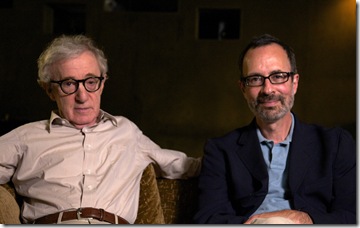Take one of the world’s best documentarians, give him complete access to one of the world’s premiere directors, and the result is Woody Allen: A Documentary [PBS, Sunday & Monday, 9/8C] – Robert Weide’s surprisingly intimate and candid portrait of the writer/director/actor/comedian/musician [how’s that for a multi-hyphenate?].
Woody Allen has made forty-seven films – all of which he’s either written or co-written and at least a dozen of which qualify as great – over the last forty years. He claims his theory is that if he makes enough films a few of them will be worthwhile. He has written for comedy greats like Sid Caesar; been one of the premiere standup comics of the mid-20th century, and traveled the world as clarinetist in a New Orleans-style jazz band.
And, of course, there was the scandal when he fell in love with his girlfriend’s [much younger] adopted daughter.
Weide spent a year and a half with Allen, much of that time on the set of You Will Meet A Tall Dark Stranger – as well as his editing room and his home. Through Weide’s efforts we learn how Allen works as a director and why actors love to work with him [that they consider working with him a high point in their careers, we already know].
Between eliciting such candor from Allen and being able to interview everyone from Allen’s co-writers [Marshall Brickman, Mickey rose and Doug McGrath] and sister Letty Aronson to actors [Scarlett Johansson, Josh Brolin, Diane Keaton, Antonio Banderas and many more] and critics [Time Magazine’s Richard Schickel, Leonard Maltin and F.X. Feeney], to the owner of The Bitter End Café [Fred Weintraub] where Allen broke as a comic and legendary cinematographers [Gordon Willis, Vilmos Zsigmond], Weide puts together a portrait of a humble man who managed to achieve all his career goals by simply going forward and doing the work.
The three-and-half hour documentary gives a look at Allen working – with Johansson and Brolin, for example – and doing the PR to support his films [a part of his job he loathes but, ironically, is extremely good at] – and features clips of Allen on The Dick Cavett Show [Cavett also contributes some telling insights in interview clips], playing with his band and working the red carpet at Cannes.
Interestingly, the contributions of Columbia University Cinema Professor Annette Insdorf reminded me of the Marshal McLuhan sequence from Annie Hall [I had to wonder what Allen would make of her comments].
The most fascinating parts of the doc, for me, are his discussion of the scandal – he really didn’t think he famous enough to warrant all the press coverage] and the look at how he writes [his collection of handwritten notes on scraps of paper and sheets of foolscap; the typewriter on which he’s written everything he’s done [reminiscent of William Gibson, who created the cyberpunk sub-genre of science fiction, but writes everything on a battered old typewriter] – and his uniquely simple equivalent of cutting and pasting.
Weide makes the point that Allen’s work can be astonishingly complex but that the auteur works with a simplicity that is refreshingly straightforward – and very effective.
Whatever one thinks of Allen the person, Woody Allen: The Documentary shows that the Allen who produced The Purple Rose of Cairo, Manhattan, Midnight in Paris and Annie Hall is without a doubt an American master – and a real Renaissance man.
Final Grade: A
Photo courtesy of B Plus Productions
